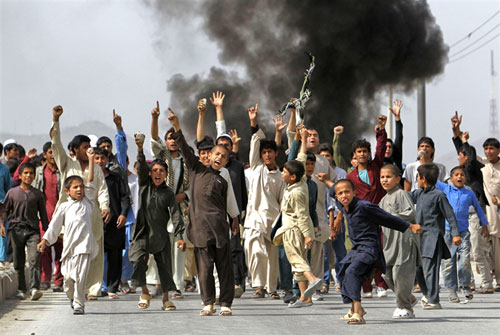
In November 2013, a British marine, known only as Sergeant A, was found guilty of murder by a military tribunal. Together with two other marines, he had been charged with shooting an injured Taliban fighter in September 2011. The three marines dragged the badly wounded fighter out of sight of an observation balloon, scoffed at any idea of administering first aid and killed the fighter with a shot to the stomach. Sergeant A said, ‘There you are, shuffle off this mortal coil you cunt. It’s nothing you wouldn’t have done to us. Obviously, this don’t go anywhere fellas. I’ve just broken the Geneva Convention.’ Marine B said ‘Yep, rog: if it ever comes to light, it’ll have been a warning shot.’
The whole incident was filmed on a video camera attached to Marine B’s helmet. Incredibly, he was using it to record souvenir footage. The video came to light on another soldier’s laptop. It was reported that several other marines had copies.
Marines B and C were acquitted and told to return to their duties. This was despite the fact that Marine C had offered to shoot the Taliban fighter in the head and that one of the marines had written in his diary that he was ‘mugged off’ that he had not been able to ‘pop-off the Taliban shitbag’ himself, suggesting that one of them, at least, is quite capable of repeating such a crime.
The murder verdict carries a mandatory life sentence but Judge Advocate General Beckett called for a psychological report on Marine A before sentencing. A Royal Marine commander called for leniency and refused to condemn a member of the marines’ ‘family’. Most of the media were at pains to emphasise the horrific violence witnessed by the marines and the casualties suffered by their comrades in the build-up to the incident. In recent times, Private Ian Thain served just 22 months in an open prison for the murder of Thomas Reilly in Belfast in 1983. Thain remained on full pay and was reinstated in the Army on release. The only other British soldier convicted of murder was Paratrooper Lee Clegg in 1990, who killed two teenagers in Belfast. He was cleared on appeal. In September 2006, Corporal Donald Payne admitted war crimes in the killing of Baha Mousa, an Iraqi hotel receptionist, but he was convicted only of inhumane treatment and gaoled for one year.
US atrocities
Atrocities have been committed by US troops in Afghanistan. In March 2012, 27 Afghan villagers were killed in a US raid. They included nine children who were killed while they slept and two women who were raped before they were shot. Only one of the 20 soldiers involved was disciplined. In Wardak province, the bodies of 17 Afghan men were found in shallow graves last winter. They had been detained at the nearby US base. In the spring, the bodies of ten more villagers were discovered close to a US special forces base. Local people claimed they had been abducted along with eight others. In February 2013, a student was found with his throat slit. Family members said he had been taken by US Green Berets. Other bodies were found. In July, the military stated that, ‘After thorough investigation, there was no credible evidence to substantiate misconduct by ISAF or US forces.’ US authorities have consistently blocked requests by Afghan officials to investigate these and other incidents. The US insists that its personnel are immune from prosecution by the countries in which they operate.
The attitudes surrounding the killing of the wounded Taliban fighter and the manner in which both the British and US establishments try to shield their military personnel suggest that such illegal killings and atrocities are far more common than the few that reach the public domain. The image of clean-cut heroes that the ruling classes and their media perpetuate in order to instil public support for their imperial wars is misleading. Large numbers of serving and veteran personnel from the armed forces suffer alcohol-related problems, uncontrollable violent behaviour, PTSD and other psychological problems. On leaving the forces they are more likely than average to be unemployed, homeless or go to prison. The Pentagon reported 349 suicides among active duty US troops in 2012: up from 301 in 2011 and considerably more than the 295 killed in Afghanistan in 2012. As ‘Kevin’, who served with the British Black Watch in Iraq, told the Big Issue, ‘The army trains you how to kill, kill, kill, but they don’t teach you how to make a peace.’ A Forces Watch survey shows that the youngest soldiers suffer worst of all. These are almost entirely recruited from the poorest, worst educated sections of the working class. Britain is the only country in Europe, and one of only 19 nations worldwide, to recruit at the age of sixteen.
None of this, of course, excuses their atrocities or diminishes the immeasurably greater suffering of the Afghan people, which the US intends to extend by maintaining its troops, bases, airfields and drones in Afghanistan until at least 2024.
Jim Craven




